What Is AI Development? How It Works, And The Challenges
- BLOG
- Artificial Intelligence
- October 19, 2025
In 2025, AI isn’t just writing poetry or playing chess. It’s diagnosing cancer, generating lifelike videos, and helping scientists discover new drugs in weeks instead of years. The pace of advancement is staggering.
AI has become a driving force of innovation across industries, from healthcare to transportation, fundamentally reshaping how we live, work, and create. But what is AI development exactly, and how does it fuel this transformation?
The truth is, it’s not just about algorithms or code. It’s about creating systems that can think, learn, and even evolve. Curious to know how?
Keep reading to know about its real-world impact and highlighted trends shaping our future.
Contents
- 1 A Quick Overview of Artificial Intelligence
- 2 What is AI Development?
- 3 Key Components of Artificial Intelligence
- 4 How to Get Started with AI Development?
- 5 Key Considerations at Each Stage of the AI Development Life Cycle
- 6 Collaborate with Webisoft to craft innovative AI solutions.
- 7 Applications of AI Development: Real-world Use Cases
- 7.1 Healthcare Diagnostics and Predictive Analysis
- 7.2 Autonomous Vehicles and Intelligent Transportation
- 7.3 Workplace Automation and Cognitive Assistants
- 7.4 Personalized Education and Adaptive Learning
- 7.5 Financial Services: Risk, Fraud Detection, and Advisory
- 7.6 Climate Change and Environmental Monitoring
- 7.7 Cybersecurity and Threat Intelligence
- 7.8 Document Digitization
- 8 Challenges and Ethical Questions in AI Development
- 9 The Future of AI Development: Trends to Watch in 2025 and Beyond
- 10 How Webisoft Drives AI Development: Custom Solutions for Your Business Needs
- 11 Collaborate with Webisoft to craft innovative AI solutions.
- 12 In Closing
- 13 Frequently Asked Questions
A Quick Overview of Artificial Intelligence
Artificial Intelligence (AI) is the field of study focused on creating systems capable of performing tasks that typically require human-like intelligence. Such as learning, problem-solving, and decision-making.
While the idea of AI dates back to early computers in the 1940s, today’s approaches draw from various disciplines. It includes computer science, psychology, and neuroscience.
The term “Artificial Intelligence” itself was coined in the 1950s. AI systems process large amounts of data using algorithms to make predictions or automate tasks.
It’s a rapidly evolving field with significant impact across industries, from healthcare to finance, shaping technology and society’s future.
And if you’re a beginner, Webisoft offers expert AI services, from strategy consultation to automation. We help businesses integrate AI-driven solutions effectively with our Enterprise AI solutions.
What is AI Development?
AI development is all about creating systems that can perform tasks requiring reasoning, learning, and adaptation, similar to how humans think.
It all begins with you clearly defining the problem and setting measurable goals.
From there, you gather and prepare the right data, ensuring its accuracy and structure because the quality of your data is key to the system’s success.
Next, you select and build models designed to recognize patterns and learn from your data. These models are constantly tested and refined to improve performance.
In AI development, you’ll likely collaborate with professional developers, experts in computer science, mathematics, and other fields to bring the solution together.
Once your model is performing well, you integrate it into real-world applications, continuously monitoring and updating it as new data or conditions come in.
The industry is evolving and is expected to contribute over $15.7 trillion to the global economy by 2030.
Key Components of Artificial Intelligence
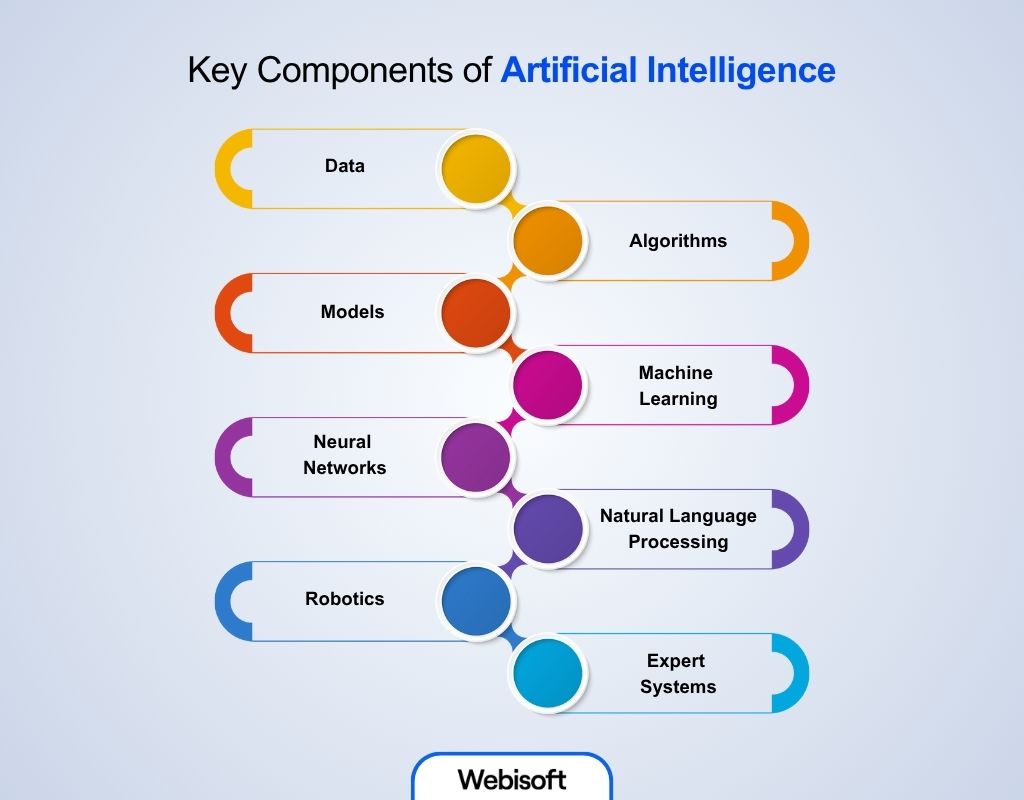
AI integrates several essential components that help machines perform tasks that require reasoning, learning, and adaptation. These components work together to form intelligent systems capable of improving over time, demonstrating the working of AI agents.
Data
Data serves as the foundational input for AI systems. It includes structured data like tables and databases, as well as unstructured data such as text, images, and audio. The accuracy, diversity, and volume of data directly influence the system’s learning capacity and final performance.
Algorithms
Algorithms define the logical procedures AI systems follow to analyze data and generate results. These mathematical formulas and rules enable pattern recognition, classification, and prediction. The choice of algorithm impacts efficiency, accuracy, and the ability to handle complex tasks.
Models
Models are mathematical constructs built from data and algorithms. They represent learned knowledge and are used to interpret new data, make predictions, or classify information. Model complexity varies depending on the problem, ranging from simple linear models to deep neural networks.
Machine Learning
Machine learning is a subset of AI where systems learn from data. By analyzing large datasets, machine learning models improve their performance without direct programming. The more data they process, the better they adapt and refine their decision-making.
Neural Networks
Neural networks mimic the structure of the human brain. These interconnected layers of nodes help AI systems recognize complex patterns, such as speech or images. With each cycle, the system fine-tunes its connections to improve its understanding and response.
Natural Language Processing
Natural language processing (NLP) equips AI with the ability to understand, interpret, and generate human language. It involves tasks such as language translation, sentiment analysis, and conversational interfaces, bridging communication between humans and machines.
Robotics
Robotics combines AI with physical machines. These robots can carry out tasks that require decision-making and interaction with the environment. They apply sensors, algorithms, and machine learning to adjust to new situations and perform actions in real time.
Expert Systems
Expert systems simulate human expertise in specialized fields. These systems use a knowledge base of facts and rules to solve problems or make recommendations. In industries like healthcare and finance, expert systems provide insights based on vast amounts of data and experience.
How to Get Started with AI Development?
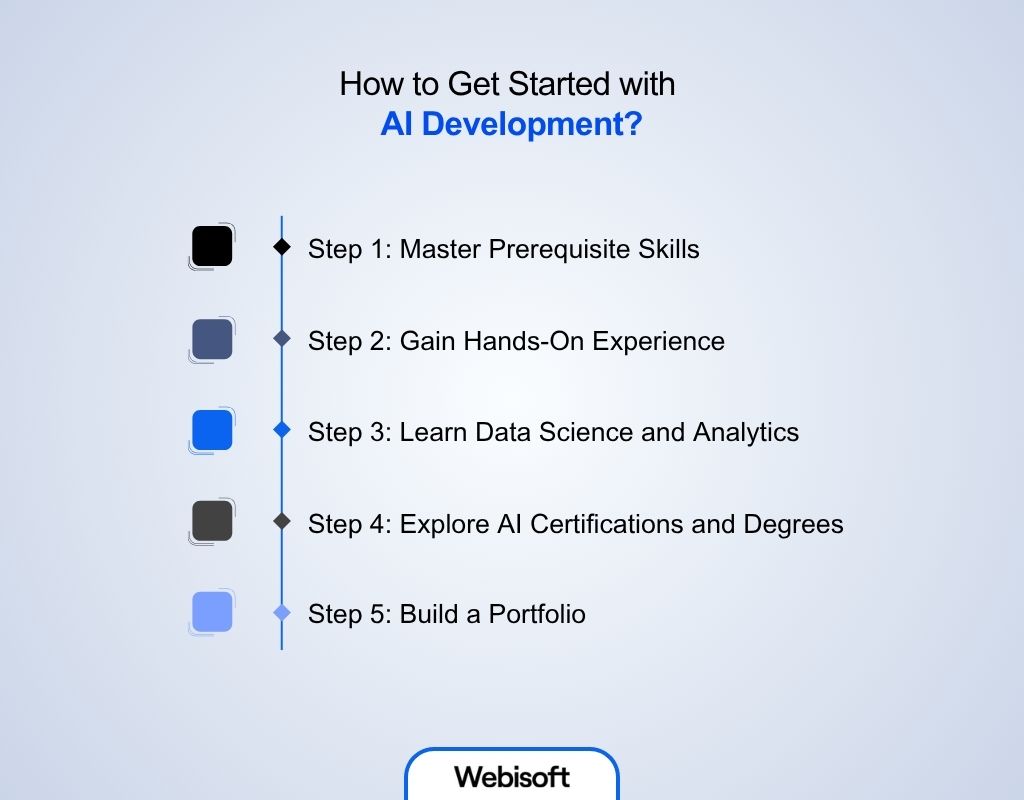
Artificial Intelligence is revolutionizing industries, with a growing demand for skilled developers.
Developing AI offers numerous opportunities.
So, at the stage of learning what is AI development, knowing how to get started is essential to tap into this expanding field.
Step 1: Master Prerequisite Skills
Before getting into AI development, focus on building foundational knowledge in programming, mathematics, and machine learning.
Start by learning Python or any other preferred language needed for AI development
Focus on key areas of mathematics, including linear algebra, probability, and statistics. Online platforms like Coursera or MIT provide excellent resources.
After that, get into machine learning basics, such as supervised and unsupervised learning.
You can experiment with algorithms through coding challenges to build problem-solving skills.
Step 2: Gain Hands-On Experience
Next, start working with AI frameworks and tools, such as TensorFlow, PyTorch, and Keras. These platforms simplify building models and let you work on real-world AI projects.
Focus on applying machine learning techniques and experimenting with datasets to build practical AI solutions.
Step 3: Learn Data Science and Analytics
AI heavily relies on data, so you’ll need to understand how to handle large datasets. Learn data engineering, preprocessing, and analytics.
Use tools like Pandas, NumPy, and SQL to manipulate data and extract insights. Strong data skills help ensure that your AI models function effectively.
Step 4: Explore AI Certifications and Degrees
Consider formal education, such as a degree in computer science or data science, to solidify your understanding.
Supplement this with certifications in AI, machine learning, or deep learning from platforms like Coursera or edX. These certifications validate your skills and increase job prospects.
Step 5: Build a Portfolio
Start building a portfolio with hands-on projects. Apply machine learning algorithms and experiment with deep learning models. Showcase your work on platforms like GitHub to demonstrate your practical experience.
Key Considerations at Each Stage of the AI Development Life Cycle
Before implementing the AI products, it’s crucial to address several key factors at every stage of the AI lifecycle to ensure your solution is ethical, effective, and compliant.
Key Considerations at Each Stage of the AI Development Life Cycle
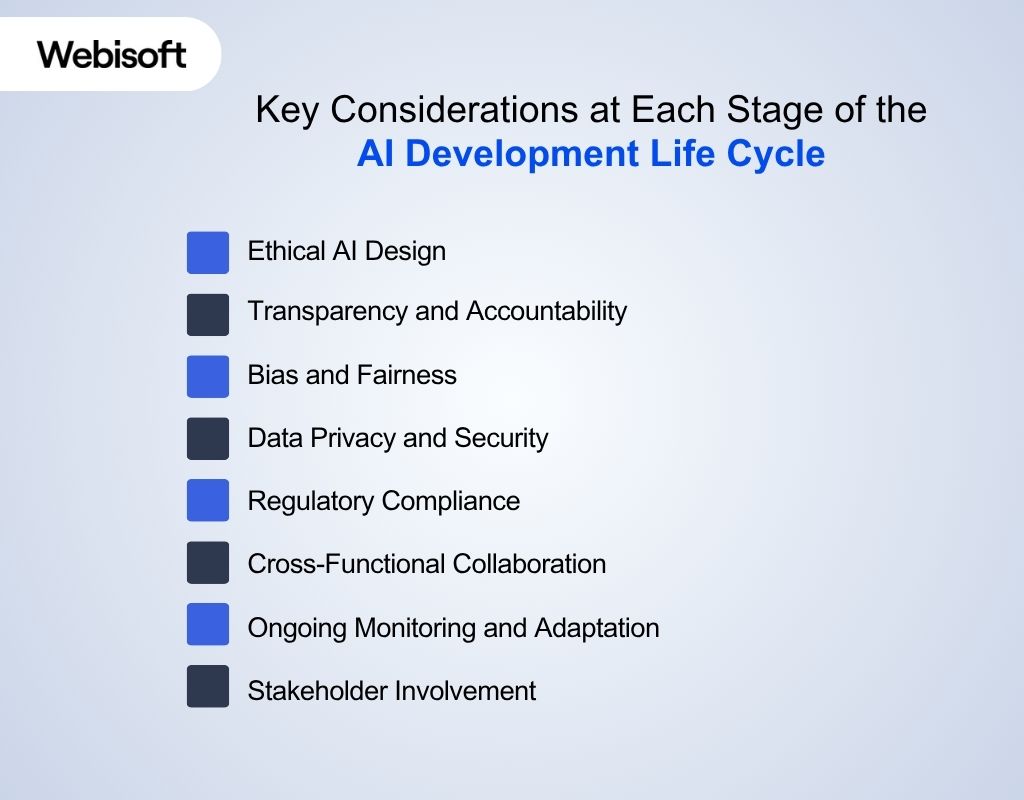
Understanding what is AI development involves is the first step to ensuring success. These considerations can help you avoid common pitfalls and make your AI systems more trustworthy and impactful. That’s why knowing the Functions of AI agents is equally important for businesses adopting intelligent systems.
Ethical AI Design
As you start your AI journey, think about the ethics behind your models. It’s important to ensure fairness by using diverse datasets that minimize bias. By doing this, you’ll build systems that make fair decisions, especially in sensitive areas like hiring or credit scoring.
Transparency and Accountability
Are your AI models easy to understand? Incorporating Explainable AI (XAI) techniques will help you make your AI decisions more transparent, which is critical in sectors like healthcare. Clear explanations will boost trust among users, ensuring they feel confident in how AI works.
Bias and Fairness
It’s not enough to assume your AI is fair. You should regularly test your models for biases, particularly in areas like law enforcement or recruitment. By addressing bias upfront, you’ll create more equitable outcomes that people can rely on.
Data Privacy and Security
As you collect and process data, you need to prioritize privacy. Make sure you’re following data protection laws like GDPR or HIPAA. By securing personal information through encryption and anonymization, you protect users and build a reputation for reliability.
Regulatory Compliance
Are you keeping up with industry regulations? Ensuring your AI systems meet regulatory requirements, such as those in healthcare or finance, is essential. Staying compliant not only protects your business but also shows your commitment to ethical AI practices.
Cross-Functional Collaboration
AI development isn’t a solo effort. It’s important to collaborate with business leaders, engineers, and domain experts. Effective communication tools, like Slack or Trello, will help you keep everyone on the same page and drive your AI projects forward efficiently.
Ongoing Monitoring and Adaptation
AI doesn’t end at deployment. As you roll out your solution, be prepared to monitor its performance and adapt to new data. Regular updates will ensure that your system continues to perform well, even as circumstances change.
Stakeholder Involvement
Don’t wait until the final product to involve your users. Getting feedback early in the development process helps ensure your AI solution is user-friendly and meets real-world needs. The more you engage with stakeholders, the better your solution will be.However, developing AI products often seems daunting, but it’s not when you’re with the right partner.
Collaborate with Webisoft to craft innovative AI solutions.
Schedule a free consultation. Let’s transform your ideas into powerful AI applications.
Applications of AI Development: Real-world Use Cases
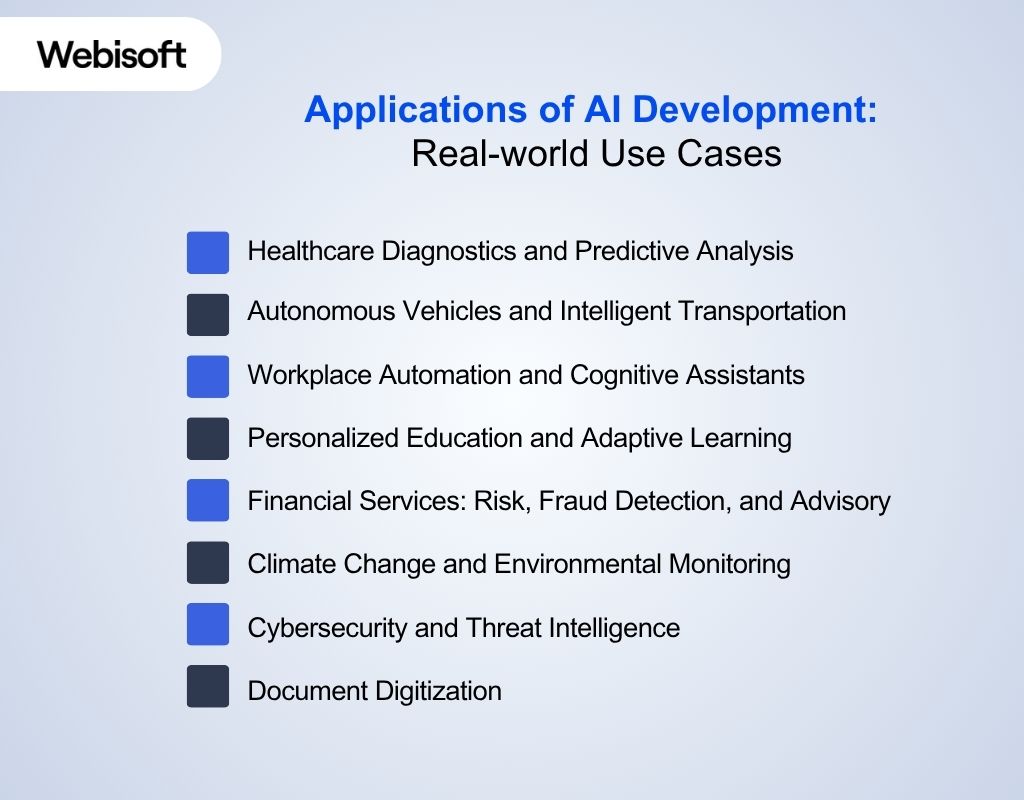
Artificial intelligence development is reshaping industries in 2025 with practical solutions that address complex challenges and boost efficiency.
Understanding what is AI development key to realizing its full potential and driving innovation across sectors.
Here are some of the most impactful real-world AI applications:
Healthcare Diagnostics and Predictive Analysis
AI systems analyze medical images, genetic data, and patient records to detect diseases earlier and more accurately than traditional methods. Predictive models assess health risks and support personalized treatment plans, improving patient outcomes and operational efficiency.
Autonomous Vehicles and Intelligent Transportation
Self-driving cars and smart logistics platforms use AI to interpret sensor data, make real-time driving decisions, and optimize delivery routes. That’s why you are now seeing far reduced accidents, saving fuel, and transforming urban mobility.
Workplace Automation and Cognitive Assistants
AI-powered assistants manage schedules, summarize documents, and extract insights from large datasets. Cognitive automation streamlines workflows in sectors like finance, legal, and customer service. It enhances the productivity and decision-making.
Personalized Education and Adaptive Learning
Adaptive learning platforms use AI to customer educational content to individual needs, monitor progress, and provide instant feedback. This approach supports more effective and inclusive learning environments.
Webisoft offers professional adaptive AI solutions that customize learning experiences to individual needs. You can improve engagement and outcomes through dynamic educational platforms.
Financial Services: Risk, Fraud Detection, and Advisory
AI models detect fraudulent transactions, assess credit risk, and offer investment advice. Real-time monitoring and predictive analytics improve security and expand access to financial services.
Climate Change and Environmental Monitoring
AI analyzes satellite imagery and sensor data to track deforestation, predict extreme weather, and optimize resource use. These insights guide sustainability efforts and inform policy decisions.
Cybersecurity and Threat Intelligence
AI systems monitor network activity, identify threats, and respond to cyberattacks autonomously. This proactive defense reduces response times and enhances protection against evolving risks
Document Digitization
AI-powered systems automate the extraction, classification, and validation of both structured and unstructured documents, reducing manual intervention and processing times. Automation rates for structured documents can reach up to 95%, with template matching accuracy nearing 99%.
Webisoft provides advanced document digitization services that use AI to automate and enhance your document workflows, saving time and reducing errors.
Challenges and Ethical Questions in AI Development
AI development in 2025 is progressing rapidly, but several real and persistent challenges continue to shape the field. Understanding what is AI development crucial for overcoming these obstacles and ensuring effective, ethical solutions.
Technical Expertise Gaps
Many companies face major project delays due to a shortage of skilled AI professionals. This shortage slows down AI deployment and forces organizations to rely on external consultants. It reduces costs and control over proprietary solutions.
But with the expert AI strategy consultations by Webisoft, you can expect to have cost-effective guidance with actionable insights to drive your business forward.
Model Reliability and Hallucinations
Leading tech companies have experienced significant setbacks from AI hallucinations. In 2023, Google’s Bard chatbot made a factual error about the James Webb Space Telescope in a public demo, causing a $100 billion drop in Alphabet’s market value.
Similarly, Microsoft’s Bing AI produced incorrect financial summaries during its launch, undermining user trust and attracting widespread criticism.
In customer service, Air Canada’s chatbot provided false policy information, resulting in legal action and financial penalties.
Integration and Scalability
Large enterprises often encounter difficulties moving AI models from pilot to production. Integrating new AI systems with legacy IT infrastructure can cause compatibility issues, data silos, and workflow disruptions.
For instance, many banks and healthcare providers report that scaling AI across multiple departments is hampered by inconsistent data formats.
It also impacts security requirements and regulatory constraints, leading to stalled projects and unrealized ROI.
The Future of AI Development: Trends to Watch in 2025 and Beyond
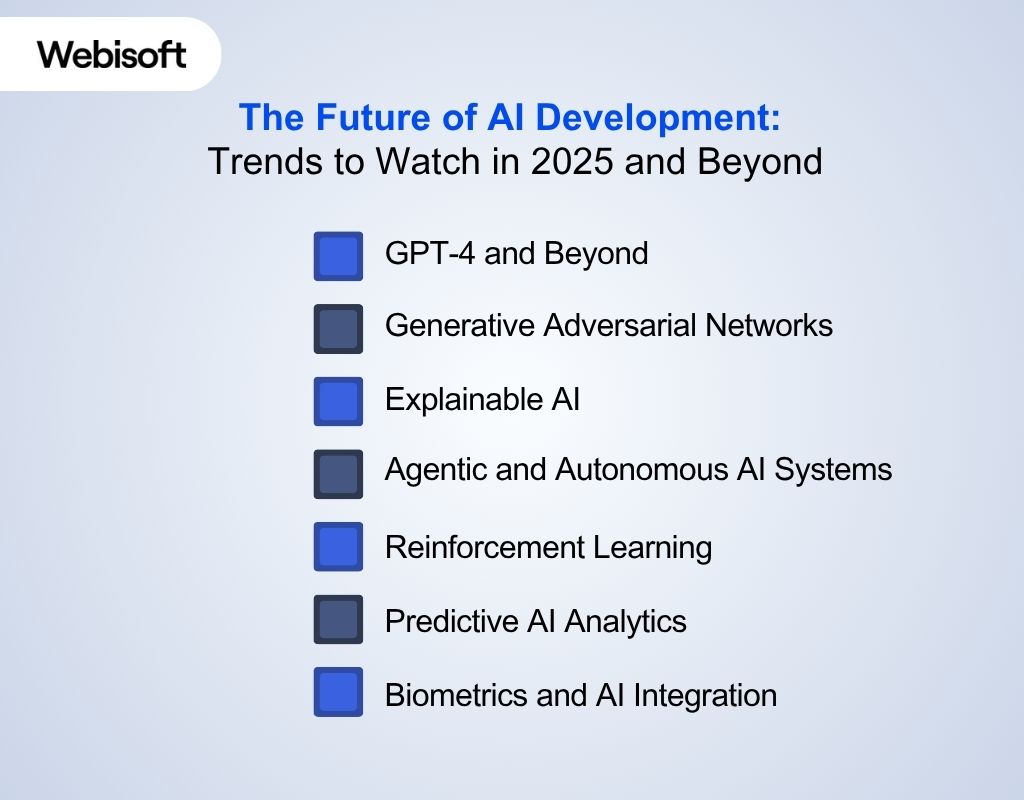
The rapid evolution of AI technologies is reshaping industries globally, with exciting advancements on the horizon. As AI continues to innovate, here’s what to watch for in 2025 and beyond.
GPT-4 and Beyond
Generative Pre-trained Transformers (GPT) have revolutionized language processing. GPT-4, with its enhanced parameters, continues to push boundaries in text generation, customer support, and content creation.
Expected to grow beyond 200 billion parameters, GPT-4’s capabilities are set to redefine industries like content generation, customer service, and more.
Webisoft offers seamless LLM/GPT integration to help you harness the full power of these advanced models. Transform your business with smarter AI solutions tailored to your unique needs.
Generative Adversarial Networks (GANs)
GANs, which pit two neural networks against each other to generate data, have found major applications in image generation, video creation, and design. Their ability to produce high-resolution images and generate realistic content is making waves in creative fields, medical imaging, and entertainment.
Explainable AI (XAI)
As AI systems become more complex, ensuring transparency in decision-making is critical. Explainable AI focuses on making AI models more understandable to humans, ensuring that their decisions can be trusted and interpreted. This trend is expected to expand across industries, especially in healthcare and finance, where trust is paramount.
Agentic and Autonomous AI Systems
Agentic AI systems are emerging, capable of making decisions and managing complex tasks independently. These systems are transforming workflows, from project management to creative collaboration. They are expected to become integral in both business and daily life
Webisoft offers advanced Agentic AI solutions to help businesses automate and enhance decision-making processes across complex workflows.
Let’s integrate autonomous systems into your operations and take your business to the next level with intelligent
Reinforcement Learning (RL)
Reinforcement learning is revolutionizing fields like robotics and autonomous vehicles by enabling machines to learn from interactions with their environment.
Its applications in industries like logistics, traffic management, and personalized recommendations are growing, with RL playing a major role in optimizing real-time decisions.
Predictive AI Analytics
Predictive AI is transforming industries by predicting trends, behaviors, and future events. From customer behavior analysis in retail to predictive maintenance in manufacturing, AI is becoming integral to strategic planning. It helps companies make informed decisions based on data-driven insights.
Biometrics and AI Integration
AI-driven biometrics, including facial recognition, fingerprint scanning, and behavioral biometrics, are playing a significant role in enhancing security and fraud prevention. Their growth is expected to expand further, with new methods like gait and DNA biometrics entering the scene.
How Webisoft Drives AI Development: Custom Solutions for Your Business Needs
At Webisoft, we help businesses thrive through customized AI solutions that address your unique needs and challenges. Our skilled team specializes in creating intelligent systems that boost efficiency and foster innovation.
Here’s how we can assist with AI development:
- Artificial Intelligence: We develop powerful AI systems tailored to your business requirements, improving decision-making, automation, and overall performance.
- AI Strategy Consultation: Our experts provide insights and strategies to guide your AI journey, ensuring alignment with your business goals.
- LLM/GPT Integration: Enhance your operations with advanced language models and GPT integration for smarter, more efficient communication and data analysis.
- Automated Decision Systems: We help you implement AI-powered decision-making systems that process large datasets and provide actionable insights in real-time.
- Document Digitization: Our AI-driven solutions automate document extraction, classification, and validation, significantly reducing manual processing times and improving accuracy.
Webisoft provides professional AI development services, designed to help your business stay ahead in the competitive landscape.
Collaborate with Webisoft to craft innovative AI solutions.
Schedule a free consultation. Let’s transform your ideas into powerful AI applications.
In Closing
Well, that’s all here about what is AI development. As AI continues to transform industries and accelerate innovation, understanding its development is more important than ever.
From healthcare breakthroughs to intelligent systems that shape the future of work, AI is here to stay, and it’s only getting smarter.
Whether you’re looking to integrate AI into your business, find new opportunities, or stay ahead of emerging trends, the future is now.
At Webisoft, we specialize in creating adaptive, cutting-edge AI solutions tailored to your needs.
Let us help you find the power of AI and drive your business forward. Contact us today to start your AI journey!
Frequently Asked Questions
1. What are the main components of AI development?
AI development involves several key components: data collection, machine learning algorithms, model training, and testing. These elements work together to build intelligent systems capable of performing tasks like pattern recognition, decision-making, and learning from experience.
2. How long does it take to develop an AI system?
This is a crucial information when explaining what is ai development. The timeline for developing an AI system varies based on its complexity and the resources available. Simple AI models can take weeks to develop, while more complex systems, such as self-driving cars or advanced healthcare diagnostics can take months or even years of development and refinement.
3. What programming languages are used in AI development?
Common programming languages in AI development include Python, R, Java, and C++. Python, in particular, is widely used because of its simplicity and the availability of powerful AI libraries, such as TensorFlow and PyTorch, that streamline the development process.
4. How does AI improve decision-making in businesses?
AI helps businesses make better decisions by analyzing large datasets to identify trends, predict outcomes, and automate decision-making processes. AI models can optimize everything from marketing strategies to supply chain management, enabling companies to make data-driven decisions with greater accuracy.
5. How is AI development impacting job roles in tech?
AI development is transforming job roles in the tech industry. It is automating many manual tasks, creating demand for new skills in AI, data science, and machine learning. While some jobs may be displaced, others are being created that require expertise in developing, managing, and fine-tuning AI systems.


